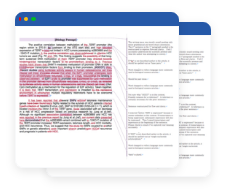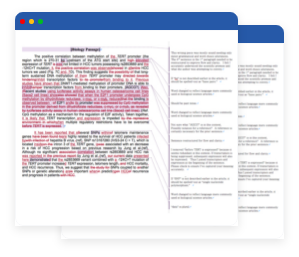代名詞的類型和例子
代名詞是用來代替名詞的詞。代名詞可以用作句子中的主詞、直接受詞、間接受詞、介系詞的受詞,可以代替任何人、動物、地方或事物。代名詞包括以下幾種類型:人稱代名詞,關係代名詞,指示代名詞,反身代名詞,疑問代名詞,所有代名詞。
代名詞的種類
| 代名詞的種類 | 代名詞的作用 | 代名詞的例子 |
|---|---|---|
|
人稱代名詞 (Personal pronoun) |
代替人、地點、事物或想法 |
I, me, she, we, us, them, it, you, they |
|
關係代名詞 (Relative pronoun) |
代替句子中的另一個名詞,用來添加更多訊息 |
Who, whom, whose, which, that, when, where |
|
指示代名詞 (Demonstrative pronoun) |
代替已經提到的名詞 |
This, that, these, those, such, none, neither |
|
不定代名詞 (Indefinite pronoun) |
代替未指明或非特指的名詞 |
Anybody, everybody, nobody, somebody, anyone, everyone, no one, someone, anything, everything, nothing, something |
|
反身代名詞 (Reflexive pronoun) |
自指主詞,作為句子的受詞使用 |
Myself, yourself, yourselves, ourselves, himself, herself, itself, themselves |
|
疑問代名詞 (Interrogative pronoun) |
用於發起問題,問的是關於某個特定名詞的情況 |
Who, what, which, whose |
|
所有代名詞 (Possessive pronoun) |
表示名詞的所有權關係 |
My, our, your, his, her, its, their |
人稱代名詞
人稱代名詞用於代替特定的語法人稱,包括第一人稱(I)、第二人稱(you)、第三人稱(he, she, it, they)。根據所指代名詞的性別和數量等情況的不同,人稱代名詞具有不同的形式。人稱代名詞包括I, you, he, she, it, we they, me, him, her, us, them。
- 例句
- She is clever.
- 例句
- Did you make a reservation for three?
- 例句
- I hope you will invite them to the party.
先行詞
如果在句子中沒有明確說明名詞,代名詞對不同的人或事物的指代可能就不夠清晰。當在句子中使用代名詞時,應當先使用先行詞,讓讀者知道代名詞指的是什麼。先行詞是指在句子開頭提到的名詞或名詞短語,它在句子的後面用代名詞代替。
- 例句
- Sam drank most of the juice that he bought.
- 例句
- The team has tried its best to achieve success.
- 例句
- Many people lost their jobs because of the economic slowdown.
先行詞不清晰的例子
- 例句
- If you arrive late to the play, she won't let you in.
- 例句
- Sam sent a letter to Mark addressing the problems he encountered during his first year at school.
關係代名詞
關係代名詞用於連接關係分句和獨立分句,以進一步描述相關的人或事物。關係代名詞直接放在它所修飾的名詞或代名詞的後面。關係代名詞包括Who, whom, whose, which, that, when, where。
- 例句
- Is the man who came to look for you your father?
- 例句
- She likes books that tell stories of famous people.
- 例句
- That store, where we usually buy our groceries, is closed for the holidays.
Who vs. whom:用作主詞和受詞的代名詞
什麼時候使用“who”或“whom”,有時會讓人混淆。雖然這兩個詞都是代名詞,但它們的用法不同。“Who”用作句子的主詞,而“whom”用作動詞或介系詞的受詞。
- 錯誤
- Whom should be elected as the leader?
- 正確
- Who should be elected as the leader?
- 錯誤
- He is the person to who I am married.
- 正確
- He is the person to whom I am married.
- 錯誤
- You didn’t specify the officer who I should give this form to.
- 正確
- You didn’t specify the officer to whom I should give this form.
指示代名詞
指示代名詞用來代替句子中特定的人或物。這些代名詞也可以用來表示時間和空間的多少程度。指示代名詞包括This, that, these, those, such, none, neither。
- 例句
- He is late again. That boy is really getting on my nerves.
- 例句
- She loves all kinds of sports. These include badminton and soccer.
- 例句
- I don't like math or science. Neither is fun.
不定代名詞
不定代名詞用來代替不確定或泛指的人或物。與不定冠詞類似,這些代名詞用來指代不確定的人或物。不定代名詞包括Anybody, everybody, nobody, somebody, anyone, everyone, no one, someone, anything, everything, nothing, something。
- 例句
- No one likes to have to beg for something.
- 例句
- Everyone is welcome to join the class.
- 例句
- Anything is possible only if you keep trying.
反身代名詞
反身代名詞用來代替句子的主詞。反身代名詞以“-self ”(單數)或“-selves ”(複數)結尾。反身代名詞包括Myself, yourself, yourselves, ourselves, himself, herself, itself, themselves。
- 例句
- I saw myself in the mirror.
- 例句
- The book itself isn't difficult, but it's not fun to read.
- 例句
- They recommend this movie even though they have never seen it themselves.
疑問代名詞
疑問代名詞用於發起提問。疑問代名詞包括Who, what, which, whose。
- 例句
- Which essay did you like the best?
- 例句
- Whose bag is this?
所有代名詞
所有代名詞用來表示某人或某物對事物的擁有關係。所有代名詞包括My, our, your, his, her, its, their。使用這些代名詞可以避免重複用詞,使句子更為簡潔。
- 例句
-
I don't know where my sneakers went, so my sister lent me her sneakers.
I don't know where my sneakers went, so my sister lent me hers.
- 例句
-
Your plan sounds just as exciting as my plan.
Your plan sounds just as exciting as mine.
在寫作中正確使用代名詞有助於提升表達清晰度、確保文法正確,並讓讀者能夠順利理解主詞而不感到困惑。建議使用標點符號檢查器,確保你的文章中沒有代名詞使用錯誤,提升寫作與文章品質!









